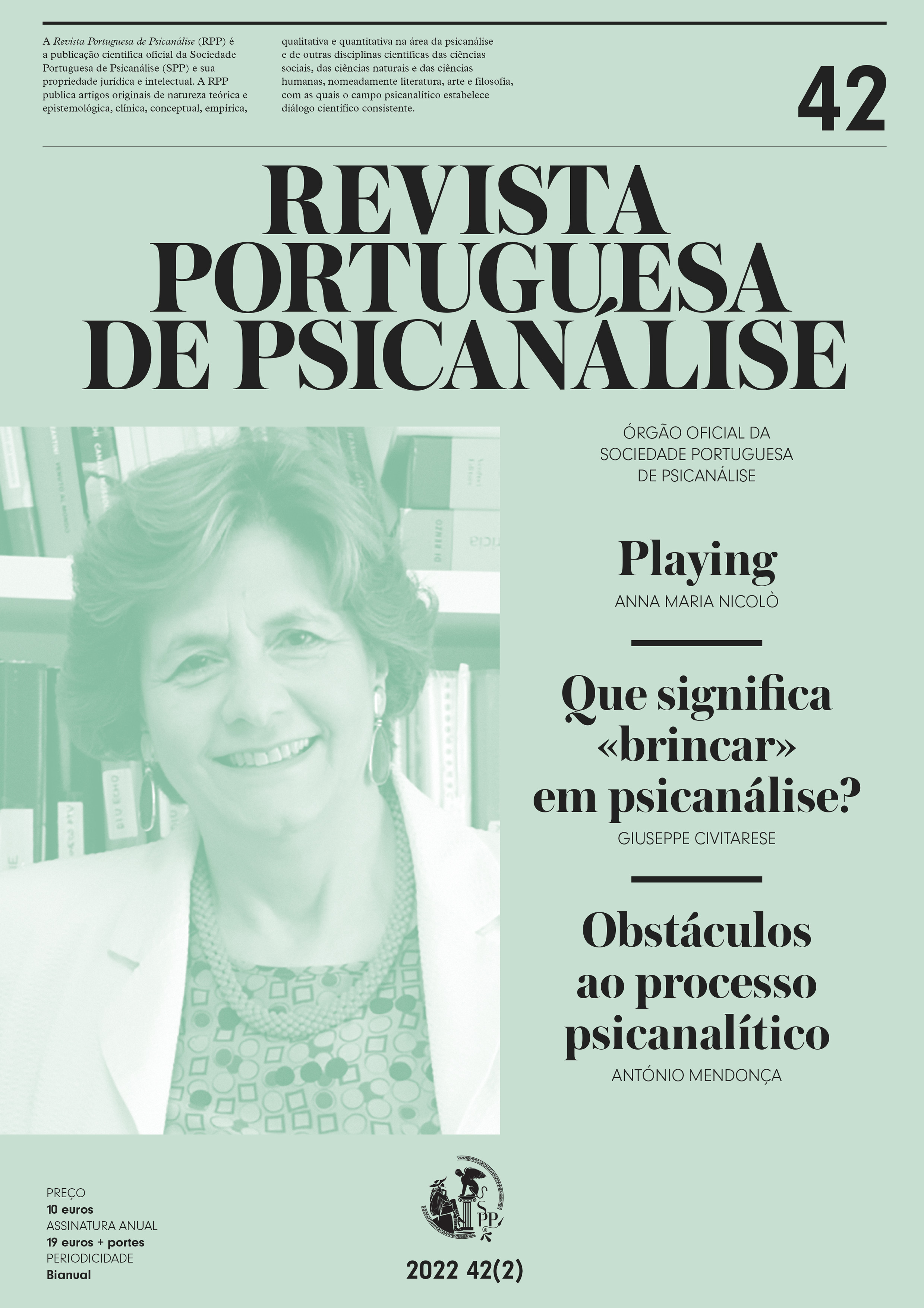A Temporalidade em Psicanálise

Abstract
The author reflects on the concept of temporality in Psychoanalysis, highlighting its contributions to psychoanalytic thought, namely through the concept of psychic change. Time for Physics and subjective time, a construct of Psychoanalysis, revolutionized the traditional conception of time for humanity. The analysis of the meanings of the category of time in Psychoanalysis involves delimitations at different levels, in which past, present and future are interconnected and coexist in the same present psychic space. It goes through the most significant evolutionary conceptions of temporality in Freud’s work, based on the works of authors who focused on the theme, with emphasis on the work of André Green. It refers to the most relevant distinct psychoanalytic approaches, encompassing theory and technique, coming from French Psychoanalysis — which emphasized a non-linear form of après-coup temporality — and English Psychoanalysis — with an emphasis on a more linear developmental model of temporality. Issues related to time are the basis of psychoanalytic theory, analytic setting and psychic phenomena. Illustrates, through clinical vignettes, some issues related to temporality in the psychoanalytic process.
Keywords
Temporality, Psychoanalysis, Psychic time
Author Biography
Ana Dias
Mestre em Psicologia Clínica pela Universidade de Lisboa. Psicoterapeuta e Psicanalista; Membro Associado da Sociedade Portuguesa de Psicanálise (SPP) e da Associação Psicanalítica Internacional (IPA).
References
- Alexandre, M. F. (2014). A Experiência Psíquica. Ensaios sobre a construção do processo psicanalítico. Fenda.
- Bergson, H. (2001). Time and free will. An essay on the immediate data of consciousness. Dover Publications. (Obra original publicada em 1913.)
- Birksted-Breen, D. (2009). Reverberation time, dreaming and the capacity to dream. The International Journal of Psychoanalysis, 90, 35–51.
- Birksted-Breen, D. (2016). The work of psychoanalysis. Sexuality,Time and the psychoanalytic mind. Routledge (New Library of Psychoanalysis).
- Borges, J. L. (1989). História da Eternidade. Em Jorge Luis Borges, Obras Completas 1923-1949, vol. i, (pp. 362–438). Teorema. (Obra original publicada em 1936.)
- Canestri, J. & Fiorini, L. C. (2009). The experience of time. Psychoanalytic Perspectives. Karnac Books.
- Collins, S. (2020). Psychic time as occasion for enactment. The International Journal of Psychoanalysis, 101(3), 436–455.
- Green, A. (2002). Time in psychoanalysis. Some contradictory aspects. Free Association Books.
- Green, A. (2009). From the ignorance of time to the murder of time. From the murder of time to the misrecognition of temporality in psychoanalysis. Em Leticia Fiorini & Jorge Canestri (Eds.), The Experience of Time. Psychoanalytic Perspectives (pp. 1–19). Karnac Books.
- Hawkings, S. (1988). A Brief History of Time. From big bang to black holes. Bantam.
- Kernberg, O. (2008). The destruction of time in pathological narcisism. The International Journal of Psychoanalysis, 89, 299–312.
- LaFarge, L. 2014. On time and deepening in psychoanalysis. Psychoanalytic Dialogues, 24(3), 304–316.
- Laplanche, J. & Pontalis, J.B. (1990). Vocabulário de Psicanálise. Presença. (Obra original publicada em 1967.)
- Meissner, W. W. (2007). Time, self and psychoanalysis. Jason Aronson.
- Muldoon, M. (2006). Tricks of time. Bergson, Merleau-Ponty and Ricoeur in search of time, self and meaning. Duquesne University Press.
- Perelberg, R. (2008). Time, space and phantasy. Routledge.
- Poulichet, S. (1994). O tempo na psicanálise. Jorge Zahar.
- Sabbadini, A. 2014. Boundaries and Bridges. Perspectives on time and space in psychoanalysis. Karnac Books.
- Smith, H. F. (2009). The past is present, isn’t it?. Em Leticia Fiorini & Jorge Canestri (Eds.), The Experience of Time. Psychoanalytic Perspectives (pp. xv–xvii). Karnac Books.